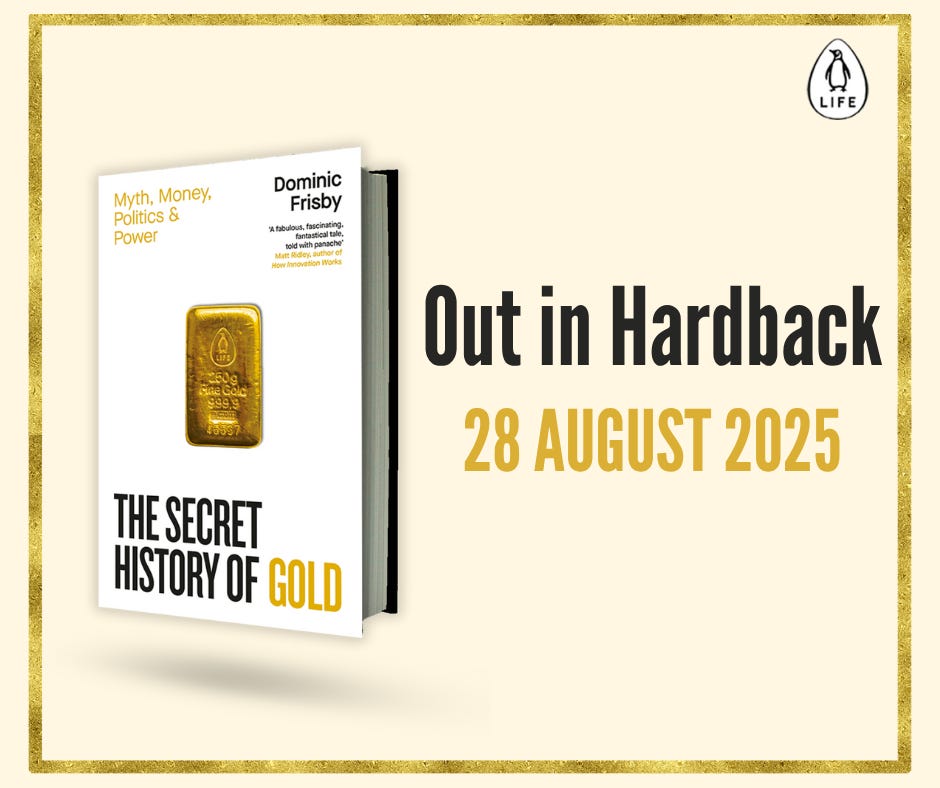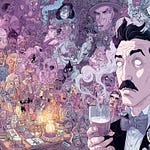NB I will put out my thoughts on the Comstock Inc (LODE.NYSE) earnings call in my mid-week commentary. A reminder: Sundays are for thought pieces, currently around gold as my book on that subject is about to come out. Midweek is for market stuff.
“I'm Henry the Eighth, I am!
Henry the Eighth, I am, I am!”
Fred Murray and R. P. Weston
History has given Henry VIII mixed reviews.
Never mind the wife-killing, he was the king who boldly stood up to papal supremacy, paving the way for freedom, Reformation and the buccaneering spirit which marked the Tudor age. That said, I doubt Henry knew at the time what the long-term consequences of his papal stand-off would be.
His Great Debasement, however, must be one of the greatest inflationary thefts by a ruler on their people in British history. Even William Pitt pales in comparison. Never speak ill of the dead and all that, but extravagant (and not in a good way), power-mad, and hypocritical are all adjectives that spring to mind about Henry VIII.
Historian Simon Sebag Montefiore goes further, declaring him egotistical, paranoid and tyrannical, and listing him as one of History's 101 Monsters, alongside Vlad the Impaler and Adolf Hitler.
How prosperity ended serfdom
When Henry VIII was crowned king in 1509, the national finances were in rare good shape. His predecessor Henry VII had broken the mould of mediaeval English monarchs. Rather than wage war, he avoided it. His reign saw just one overseas conflict. He pursued marriages and alliances overseas instead. He had a formidable business brain: rather than resist economic change and new technology, he encouraged it - and then taxed it. In doing so, he built up extraordinary wealth for the Crown. He became the first English king for centuries to run a surplus. Imagine! His taxation and legislation of the nobility ended the power of the barons and, effectively, feudalism itself, while establishing the freedom of the mercantile classes to trade. England got its first blast furnace, and so began its iron industry. The wool trade blossomed, and the farming of sheep accelerated the decline of serfdom (land no longer needed working in the same way), and the country was changing to a money- rather than land-based economy.
Henry VII also had new coins issued to ensure a standard currency. Weights and measures were also standardised (though not for the first nor the last time).
Things however changed with his son, Henry VIII - and rapidly. One of Henry VIII’s first acts, two days after his coronation, was to arrest the two men responsible for collecting his father’s taxes, Sir Richard Empson and Edmund Dudley. He charged them with high treason and they were duly executed. Today’s HMRC officers don’t know how lucky they are.
War is an expensive business, when you lose.
Not a man known for his humility, he was happy to usher in the idea that kings had Divine Right, an issue that, 100 years later, would cause a civil war and the death of 200,000 people. Never mind his Great Debasement, which we will come to in a moment, the idea that a king was appointed by God and had Divine Right must be another of the greatest frauds perpetrated on a nation by its rulers. Anyone who dissented was treasonous or heretical, often executed without formal trial - or simply banished.
He got involved in numerous costly and largely unsuccessful wars both on the continent and up north in Scotland. War is an expensive business when you lose. These, coupled with a personal extravagance that people are still talking about, meant he was constantly on the verge of financial ruin.
To pay for it all he introduced numerous new taxes, including a tax on beards, which, given his own facial hair, has to go down as one of the ruling classes’ great do-as-I-say-not-as-I-do moments. In 1523 he demanded 20% of people’s income. (20% seems like a pipe dream today). He sold crown land, dissolved monasteries, and seized the assets of over 800 religious houses—land, gold, silver, everything—under the guise of reforming the church and rooting out corruption. Any money paid to Rome and the Pope was “redirected” to the royal coffers. In doing so he robbed local communities of their support systems - almshouses and so on.
But still he couldn’t get enough money - and so he ordered what became known as the Great Debasement. The amount of gold and silver in coins was reduced and, in some cases, replaced entirely with copper.
Bad money drives out good - Gresham’s observation which became law
It began in 1542 with a secret indenture. Production of current coins would continue, but new coins would also be secretly minted, including the previously unsuccessful testoon, with significantly less gold and silver. The coins would be stockpiled in Westminster Palace.
But in 1544, a lack of bullion arriving at the mint prompted the government into phase two of the scam and the debased coins were allowed to enter general circulation. Merchants soon discovered the new silver groats had been debased, and they began fetching a lower price. Coins of a similar value but with a higher precious metal content were hoarded and so disappeared from circulation - a classic case of bad money driving out good, as Gresham’s Law goes. Not only a classic case - the actual case which made Thomas Gresham articulate his law in the first place.
The king's testoons were copper coins with a thin layer of silver on top, not unlike Diocletian’s denarii. Over time the silver would wear off, especially around the nose on Henry’s face on the coin, which protruded a little and so wore away quicker, exposing the copper underneath. So did Henry VIII get the nickname Old Coppernose.
If you are interested in buying gold and silver coins which haven’t been debased, as always I recommend The Pure Gold Company. Pricing is competitive, quality of service is high. They deliver to the UK, the US, Canada and Europe or you can store your gold with them. More here.
The debasement continued after Henry VIII’s death in 1547, and was eventually revoked by his successor Edward VI in 1551. Over the course of the seven year debasement, the purity of gold coins slipped from 23 carat (96%) to 20 carat (83%), while silver coins steadily fell from 92.5% (sterling silver) as low as 25%. That’s a theft of 83% of the silver.
When Elizabeth I came to power in 1558, the debasement had affected both trading relationships (foreign merchants often refused to accept English coins) and confidence in the monarchy. Elizabeth’s advisors William Cecil and Thomas Gresham persuaded her that these problems could be solved with sound money. Following Gresham’s advice, the government passed a law which ended the legal tender status of debased coins but also banned “good” coins from entering foreign markets. Then in 1560 Elizabeth I had all debased coinage removed from circulation, melted down and replaced with higher fineness, newly minted coins - soon to be harder-to-clip milled rather than hammer-struck coins.
The crown made a tidy £50,000 from the recoinage. That’s seignourage for you.
Stories like this fill the pages of The Secret History of Gold (although this one didn’t actually make the cut).
The Secret History of Gold is available to pre-order at Amazon, Waterstones and all good bookshops. I hear the audiobook, read by me, is excellent. The book comes out on August 28.
Hurry! Amazon is currently offering 20% off.
Until next time,
Dominic
Bitcoin, Gold and Hidden Taxes
I recorded this interview when I was in Prague earlier in the summer. I actually forgot I did it, but Archie has just released it now, so if you fancy a fireside chat, here it is:














